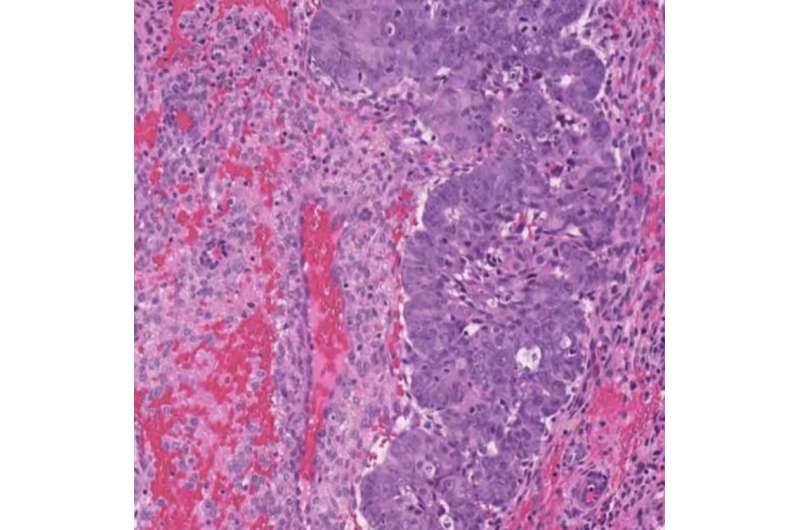A discovery by researchers on the College of British Columbia guarantees to enhance look after sufferers with endometrial most cancers, the commonest gynecologic malignancy.
Utilizing synthetic intelligence (AI) to identify patterns throughout hundreds of most cancers cell photos, the researchers have pinpointed a definite subset of endometrial most cancers that places sufferers at a lot better threat of recurrence and dying, however would in any other case go unrecognized by conventional pathology and molecular diagnostics.
The findings, printed in Nature Communications, will assist medical doctors determine sufferers with high-risk illness who may gain advantage from extra complete remedy.
“Endometrial most cancers is a various illness, with some sufferers more likely to see their most cancers return than others,” stated Dr. Jessica McAlpine, professor and Dr. Chew Wei Chair in Gynaecologic Oncology at UBC, and surgeon-scientist at BC Most cancers and Vancouver Basic Hospital. “It is so essential that sufferers with high-risk illness are recognized so we are able to intervene and hopefully stop recurrence. This AI-based method will assist guarantee no affected person misses a chance for probably lifesaving interventions.”
AI-powered precision medication
The invention builds on work by Dr. McAlpine and colleagues at B.C.’s Gynecologic Most cancers Initiative—a multi-institutional collaboration between UBC, BC Most cancers, Vancouver Coastal Well being and BC Girls’s Hospital—who in 2013 helped present that endometrial most cancers might be labeled into 4 subtypes based mostly on the molecular traits of cancerous cells, with every posing a distinct degree of threat to sufferers.
Dr. McAlpine and staff then went on to develop an progressive molecular diagnostic instrument, known as ProMiSE, that may precisely discern between the subtypes. The instrument is now used throughout B.C., components of Canada and internationally to information remedy selections.
But, challenges stay. Essentially the most prevalent molecular subtype, encompassing roughly 50% of all circumstances, is essentially a catch-all class for endometrial cancers missing discernable molecular options.
“There are sufferers on this very massive class who’ve extraordinarily good outcomes, and others whose most cancers outcomes are extremely unfavorable. However till now, we now have lacked the instruments to determine these at-risk in order that we are able to supply them acceptable remedy,” stated Dr. McAlpine.

Dr. McAlpine turned to long-time collaborator and machine studying knowledgeable Dr. Ali Bashashati, an assistant professor of biomedical engineering and pathology and laboratory medication at UBC, to attempt to additional phase the class utilizing superior AI strategies.
Dr. Bashashati and his staff developed a deep studying AI mannequin that analyzes photos of tissue samples collected from sufferers. The AI was skilled to distinguish between completely different subtypes, and after analyzing over 2,300 most cancers tissue photos, pinpointed the brand new subgroup that exhibited markedly inferior survival charges.
“The ability of AI is that it may objectively have a look at massive units of photos and determine patterns that elude human pathologists,” stated Dr. Bashashati. “It is discovering the needle within the haystack. It tells us this group of cancers with these traits are the worst offenders and symbolize a better threat for sufferers.”
Bringing the invention to sufferers
The staff is now exploring how the AI instrument could possibly be built-in into medical apply alongside conventional molecular and pathology diagnostics, because of a grant from the Terry Fox Analysis Institute.
“The 2 work hand in hand, with AI offering an extra layer on prime of the testing we’re already doing,” stated Dr. McAlpine.
One good thing about the AI-based method is that it is cost-efficient and straightforward to deploy throughout geographies. The AI analyzes photos which might be routinely gathered by pathologists and well being care suppliers, even at smaller hospital websites in rural and distant communities, and shared when looking for second opinions on a prognosis.
The mixed use of molecular and AI-based evaluation may enable many sufferers to stay of their house communities for much less intensive surgical procedure, whereas making certain those that want remedy at a bigger most cancers heart can accomplish that.
“What is admittedly compelling to us is the chance for better fairness and entry,” stated Dr. Bashashati. “The AI does not care for those who’re in a big city heart or rural neighborhood, it could simply be out there, so our hope is that this might actually rework how we diagnose and deal with endometrial most cancers for sufferers all over the place.”
Extra data:
AI-based histopathology picture evaluation reveals a novel subset of endometrial cancers with distinct genomic alterations and unfavourable final result, Nature Communications (2024). DOI: 10.1038/s41467-024-49017-2
College of British Columbia
Quotation:
Scientists uncover high-risk type of endometrial most cancers—and easy methods to take a look at for it—utilizing AI (2024, June 26)
retrieved 26 June 2024
from https://medicalxpress.com/information/2024-06-scientists-high-endometrial-cancer-ai.html
This doc is topic to copyright. Aside from any honest dealing for the aim of personal research or analysis, no
half could also be reproduced with out the written permission. The content material is supplied for data functions solely.





















